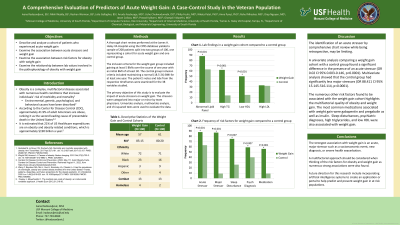Back


Poster Session D - Tuesday Morning
Category: Obesity
D0616 - A Comprehensive Evaluation of Predictors of Weight Gain: A Case Control Study in the Veteran Population
Tuesday, October 25, 2022
10:00 AM – 12:00 PM ET
Location: Crown Ballroom

Has Audio

Ivana Radosavljevic, BS
University of South Florida Morsani College of Medicine
Tampa, FL
Presenting Author(s)
Ivana Radosavljevic, BS1, Reddy Nikhil, MS2, Roshan Warman, 3, Julia Gallagher, 2, Azubuogu Anudu, MD1, Uche Chukwudumebi, DO4, Phillip Foulis, MD5, Niketa Patel, PhD6, Anna Pyayt, PhD4, Rahul Mhaskar, MD2, Diep Nguyen, PhD2, Jason M. Colizzo, MD6, Prasad Kulkarni, MD6, Gitanjali Vidyarthi, MD6
1University of South Florida Morsani College of Medicine, Tampa, FL; 2Morsani College of Medicine, Tampa, FL; 3Yale University School of Medicine, New Haven, CT; 4University of South Florida, Tampa, FL; 5James A. Haley VA Hospital, Yampa, FL; 6James A. Haley VA Hospital, Tampa, FL
Introduction: Obesity is a multi-factorial chronic illness which has been implicated as a risk factor for pathology in nearly every illness. Worldwide, 42% of the population is overweight or obese and 21% of United States healthcare spending goes towards obesity. Consequently, the World Health Organization created a global strategy for weight control initiatives. Understanding the heterogeneous variables associated with weight gain, especially over a short period of time, is paramount since this stage of obesity is potentially reversible. The aim of our study was the identification of risk factors associated with the development of weight gain in an obese veteran cohort compared to controls over a one-year period.
Methods: After obtaining IRB approval, a case-control study was performed at James A Haley VA Hospital. There were 200 subjects studied. The inclusion criteria for the study sample (n=100) were a gain in BMI of 5 in veterans with an initial BMI ≥ 30 in a span of one year or less. This sample was compared to a control group (n=100) who had a normal BMI (18.5-24) and maintained it over at least one year. 38 variables were studied.
Results: In this study, there was a significant presence of acute stressors in the weight gain cohort when compared to the control group in a univariate analysis (OR 0.02 CI 95% 0.003-0.146, p< 0.0001). Subgrouping of acute stressor revealed the control group to have fewer major stressors compared to the weight gain group in a multivariate analysis (OR 88.411 CI 95% 15.145-516.114, p < 0.0001). Additionally, there was a significantly higher presence of sleep disturbances in the weight gain cohort in a multivariate analysis (OR 0.128 CI 95% 0.028-0.583, p = 0.0079) and the presence of triglyceride abnormalities (OR 0.034 CI 95% 0.006-0.198, p = 0.0002).
Discussion: In conclusion, the strongest association with acute weight gain was the presence of a major acute stressor. This holds promise in a clinic setting at the point of care when acute weight gain is possible but frequently missed. Future direction will focus on the incorporation of artificial intelligence with these findings to develop an application to help patients connect with clinicians and track their obesity risk.
Disclosures:
Ivana Radosavljevic, BS1, Reddy Nikhil, MS2, Roshan Warman, 3, Julia Gallagher, 2, Azubuogu Anudu, MD1, Uche Chukwudumebi, DO4, Phillip Foulis, MD5, Niketa Patel, PhD6, Anna Pyayt, PhD4, Rahul Mhaskar, MD2, Diep Nguyen, PhD2, Jason M. Colizzo, MD6, Prasad Kulkarni, MD6, Gitanjali Vidyarthi, MD6. D0616 - A Comprehensive Evaluation of Predictors of Weight Gain: A Case Control Study in the Veteran Population, ACG 2022 Annual Scientific Meeting Abstracts. Charlotte, NC: American College of Gastroenterology.
1University of South Florida Morsani College of Medicine, Tampa, FL; 2Morsani College of Medicine, Tampa, FL; 3Yale University School of Medicine, New Haven, CT; 4University of South Florida, Tampa, FL; 5James A. Haley VA Hospital, Yampa, FL; 6James A. Haley VA Hospital, Tampa, FL
Introduction: Obesity is a multi-factorial chronic illness which has been implicated as a risk factor for pathology in nearly every illness. Worldwide, 42% of the population is overweight or obese and 21% of United States healthcare spending goes towards obesity. Consequently, the World Health Organization created a global strategy for weight control initiatives. Understanding the heterogeneous variables associated with weight gain, especially over a short period of time, is paramount since this stage of obesity is potentially reversible. The aim of our study was the identification of risk factors associated with the development of weight gain in an obese veteran cohort compared to controls over a one-year period.
Methods: After obtaining IRB approval, a case-control study was performed at James A Haley VA Hospital. There were 200 subjects studied. The inclusion criteria for the study sample (n=100) were a gain in BMI of 5 in veterans with an initial BMI ≥ 30 in a span of one year or less. This sample was compared to a control group (n=100) who had a normal BMI (18.5-24) and maintained it over at least one year. 38 variables were studied.
Results: In this study, there was a significant presence of acute stressors in the weight gain cohort when compared to the control group in a univariate analysis (OR 0.02 CI 95% 0.003-0.146, p< 0.0001). Subgrouping of acute stressor revealed the control group to have fewer major stressors compared to the weight gain group in a multivariate analysis (OR 88.411 CI 95% 15.145-516.114, p < 0.0001). Additionally, there was a significantly higher presence of sleep disturbances in the weight gain cohort in a multivariate analysis (OR 0.128 CI 95% 0.028-0.583, p = 0.0079) and the presence of triglyceride abnormalities (OR 0.034 CI 95% 0.006-0.198, p = 0.0002).
Discussion: In conclusion, the strongest association with acute weight gain was the presence of a major acute stressor. This holds promise in a clinic setting at the point of care when acute weight gain is possible but frequently missed. Future direction will focus on the incorporation of artificial intelligence with these findings to develop an application to help patients connect with clinicians and track their obesity risk.
Disclosures:
Ivana Radosavljevic indicated no relevant financial relationships.
Reddy Nikhil indicated no relevant financial relationships.
Roshan Warman indicated no relevant financial relationships.
Julia Gallagher indicated no relevant financial relationships.
Azubuogu Anudu indicated no relevant financial relationships.
Uche Chukwudumebi indicated no relevant financial relationships.
Phillip Foulis indicated no relevant financial relationships.
Niketa Patel indicated no relevant financial relationships.
Anna Pyayt indicated no relevant financial relationships.
Rahul Mhaskar indicated no relevant financial relationships.
Diep Nguyen indicated no relevant financial relationships.
Jason Colizzo indicated no relevant financial relationships.
Prasad Kulkarni indicated no relevant financial relationships.
Gitanjali Vidyarthi indicated no relevant financial relationships.
Ivana Radosavljevic, BS1, Reddy Nikhil, MS2, Roshan Warman, 3, Julia Gallagher, 2, Azubuogu Anudu, MD1, Uche Chukwudumebi, DO4, Phillip Foulis, MD5, Niketa Patel, PhD6, Anna Pyayt, PhD4, Rahul Mhaskar, MD2, Diep Nguyen, PhD2, Jason M. Colizzo, MD6, Prasad Kulkarni, MD6, Gitanjali Vidyarthi, MD6. D0616 - A Comprehensive Evaluation of Predictors of Weight Gain: A Case Control Study in the Veteran Population, ACG 2022 Annual Scientific Meeting Abstracts. Charlotte, NC: American College of Gastroenterology.
